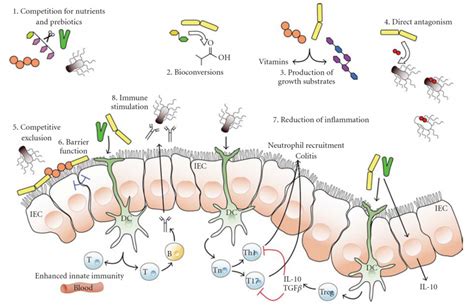How Probiotics Produce VFAs to Prevent Bacterial Infections
Probiotics, the beneficial bacteria residing in our gut, play a crucial role in maintaining a healthy digestive system. One of their key mechanisms of action involves the production of volatile fatty acids (VFAs). These VFAs aren't just byproducts; they're powerful weapons in the fight against harmful bacteria, contributing significantly to gut health and preventing infections. This post will explore how probiotics produce VFAs and the mechanisms by which these acids help maintain a balanced gut microbiome.
Understanding Volatile Fatty Acids (VFAs)
VFAs are short-chain fatty acids (SCFAs) produced by the fermentation of indigestible carbohydrates by gut microbiota. The most prevalent VFAs in the human gut are acetate, propionate, and butyrate. These acids are not just simple byproducts; they act as signaling molecules, influencing various physiological processes throughout the body. Their impact on gut health is particularly significant.
Key VFAs and their roles:
-
Butyrate: Primarily utilized by colonocytes (cells lining the colon) as an energy source. It also possesses potent anti-inflammatory properties and strengthens the intestinal barrier, preventing harmful bacteria from penetrating the gut lining. Strong anti-inflammatory and gut barrier strengthening effects are key to preventing infections.
-
Acetate: Plays a role in regulating appetite and lipid metabolism. It also contributes to maintaining gut homeostasis and suppressing the growth of pathogenic bacteria.
-
Propionate: Primarily metabolized by the liver, where it influences glucose metabolism and lipid synthesis. It also exhibits antibacterial properties.
How Probiotics Generate VFAs
Probiotics, through their metabolic processes, ferment dietary fibers and resistant starches that our bodies can't digest. This fermentation process is the primary source of VFAs in the gut. Different probiotic strains have varying capabilities in producing specific VFAs. The selection of probiotics with high VFA production is crucial for maximizing their preventative effects.
The Fermentation Process: A Simplified Explanation
-
Substrate: Indigestible carbohydrates (fibers and resistant starches) from our diet serve as the fuel for the fermentation process.
-
Bacterial Metabolism: Probiotic bacteria possess specific enzymes that break down these complex carbohydrates into simpler molecules.
-
VFA Production: Through a series of metabolic pathways, these simpler molecules are converted into VFAs, primarily acetate, propionate, and butyrate.
-
Absorption & Utilization: The produced VFAs are then absorbed by the colonocytes or enter the bloodstream to exert their various physiological effects.
VFAs: A Natural Defense Mechanism Against Harmful Bacteria
The production of VFAs by probiotics isn't just about providing energy; it's a crucial part of a sophisticated defense system against harmful bacteria. VFAs accomplish this in several ways:
-
Acidification of the Gut Environment: The acidic nature of VFAs creates an inhospitable environment for many pathogenic bacteria, inhibiting their growth and survival. This acidification is a crucial first line of defense.
-
Competition for Resources: Probiotics and harmful bacteria compete for the same resources (nutrients). The efficient VFA production by probiotics gives them a competitive edge, limiting the availability of nutrients for pathogens.
-
Direct Antibacterial Effects: Some VFAs, particularly butyrate, possess direct antibacterial effects, inhibiting the growth of specific harmful bacteria.
-
Strengthening the Gut Barrier: Butyrate, in particular, strengthens the intestinal barrier, making it less permeable to harmful bacteria and toxins. A strong gut barrier is essential in preventing infections.
Optimizing VFA Production for Gut Health
To maximize the benefits of probiotic VFA production, consider the following:
-
Dietary Fiber Intake: Consume a diet rich in dietary fiber, providing ample substrate for probiotic fermentation.
-
Prebiotic Consumption: Prebiotics are non-digestible food ingredients that selectively stimulate the growth of beneficial bacteria, including those that produce VFAs.
-
Probiotic Selection: Choose probiotic strains known for their high VFA production capabilities.
By understanding how probiotics produce VFAs and the protective role these acids play, we can appreciate the vital contribution of these beneficial bacteria to our overall health and well-being. A healthy gut microbiome, rich in VFA-producing probiotics, is a cornerstone of effective disease prevention.
